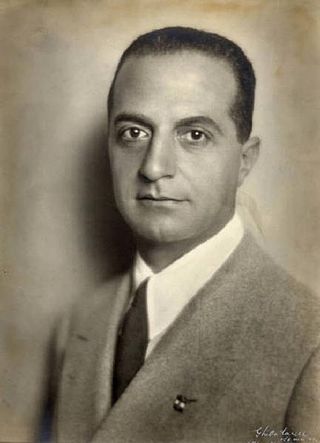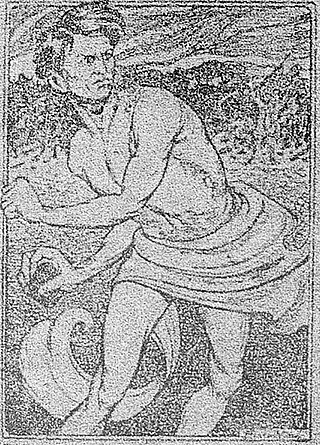Related Research Articles

Lega Nord, whose complete name is Lega Nord per l'Indipendenza della Padania, is a right-wing, federalist, populist and conservative political party in Italy. In the run-up of the 2018 general election, the party was rebranded as Lega, without changing its official name. The party was nonetheless frequently referred to only as "Lega" even before the rebranding, and informally as the Carroccio. The party's latest elected leader was Matteo Salvini.

Margherita Sarfatti was an Italian journalist, art critic, patron, collector, socialite, and prominent propaganda adviser of the National Fascist Party. She was Benito Mussolini's biographer as well as one of his mistresses.

Luigi Barzini Sr. in Orvieto, son of Ettore Barzini and Maria Bartoccini, was an Italian Senator and the most noted journalist and war correspondent of the second half of the Italian Belle Époque.

Giuseppe Bottai was an Italian journalist and member of the National Fascist Party of Benito Mussolini.
The Aventine Secession was the withdrawal of the parliament opposition, mainly comprising the Italian Socialist Party, Italian Liberal Party, Italian People's Party and Italian Communist Party, from the Chamber of Deputies in 1924–25, following the murder of the deputy Giacomo Matteotti by fascists on 10 June 1924.
Avanti! is an Italian daily newspaper, born as the official voice of the Italian Socialist Party, published since 25 December 1896. It took its name from its German counterpart Vorwärts, the party-newspaper of the Social Democratic Party of Germany.

Giuseppe Spataro was an Italian politician.

The Trentino Tyrolean Autonomist Party is a regionalist, autonomist, Christian-democratic and centrist political party in Trentino, Italy. The PATT, heir of the Trentino Tyrolean People's Party, is the unofficial counterpart of the South Tyrolean People's Party (SVP), active in South Tyrol. The two are members of the European People's Party (EPP) and usually contest general and European Parliament elections together. Simone Marchiori is the party's current secretary, while former senator Franco Panizza serves at its president. The PATT has led the provincial government with Carlo Andreotti in 1994–1999 and Ugo Rossi in 2013–2018, as well as the regional government with Andreotti in 2002–2004 and again with Rossi in 2014–2016.
The Socialist League was a tiny social-democratic party in Italy, founded by Bobo Craxi on 10 May 2000.

Gianfranco Miglio was an Italian jurist, political scientist, and politician. He was a founder of the Federalist Party. For thirty years, he presided over the political science faculty of Milan's Università Cattolica. Later on in his life, he was elected as an independent member of the Parliament to the Italian Senate for Lega Nord. The supporters of Umberto Bossi's party called him Prufesùr, a Lombard nickname to remember his role.

Luigi Federzoni was an Italian nationalist and later Fascist politician.
This is a list of words, terms, concepts, and slogans in the Italian language and Latin language which were specifically used in Fascist Italian monarchy and Italian Social Republic.

The Fasci d'Azione Rivoluzionaria was an Italian political movement founded in 1914 by Benito Mussolini, and active mainly in 1915. Sponsored by Alceste De Ambris, Mussolini, and Angelo Oliviero Olivetti, it was a pro-war movement aiming to promote Italian entry into World War I.

Julius Perathoner was an Austro-Hungarian politician who became an Italian citizen after the Treaty of Saint-Germain. He was one of the most important exponents of the Liberal Party in Tyrol and the last mayor of German ethnicity of the City of Bolzano from 1895 to 1922. On October 3, 1922 the democratically elected Perathoner was forcibly deposed as mayor during the March on Bozen from Italian fascists and replaced by a fascist functionary.

Pietro Bucalossi was an Italian physician and politician. He is remembered for his cancer research, and his austerity and small government policies while Mayor of Milan in the 1960s.

Lega, whose official name is Lega per Salvini Premier, is a right-wing populist political party in Italy, led by Matteo Salvini. The LSP is the informal successor of Lega Nord.

Alessandro Casati was an Italian academic, commentator and politician. He served as a senator between 1923 and 1924 and again between 1948 and 1953. He also held ministerial office, most recently as Minister of War for slightly more than twelve months during 1944/45, serving under "Presidente del Consiglio" Bonomi.

Francesco Salata was a Dalmatian Italian senator, politician, journalist, historian and writer. Salata was an irredentist, although he had a more legalistic approach than other contemporaries, as well as being more liberal. He was panned and attacked by the fascists, although, after they took power, he was employed by the fascist government, and wrote books apologizing for the fascist politics. Very fond of his native Istria, Salata opposed what he saw as the slavicisation carried out by Croatian priests in Istria, the Kvarner and Dalmatia. He accused the Slovenian and Croatian clergy of carrying out the slavicisation of Istria and the Kvarner. Salata upheld the idea that Dalmatia, Istria and the Kvarner were, historically, Italian lands.
References
- ↑ Alcide De Gasperi (1964). I cattolici trentini sotto l'Austria. pp. 131–133.
- ↑ I cattolici trentini fra senso della nazionalità e fedeltà all’impero
- ↑ Benito Mussolini (1911). Il Trentino, veduto da un socialista : note e notizie. Firenze: La rinascita del libro. pp. 20–34.
- ↑ Treccati online
- Gianni Faustini. Contributi recenti alla storiografia del Tiroler Volksbund (PDF).
- Il Tiroler Volksbund e la sua opera : traduzione dall'Almanacco pel Volksbund Tirolese per l'anno 1908, per cura della Lega Nazionale (sezione tridentina), Trento, Scotoni, 1908.